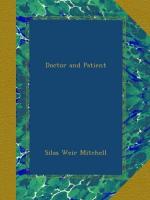Shakespeare has left us no finished portrait of a doctor. Moliere caricatured him. Thackeray failed to draw him, and generally in novels he is merely a man who is labelled “Doctor.” The sole exception known to me is the marvellous delineation of Lydgate in “Middlemarch.” He is all over the physician, his manner, his sentiments, his modes of thought, but he stands alone in fiction. How did that great mistress of her art learn all of physicians which enabled her to leave us this amazingly truthful picture? Her life gives us no clue, and when I asked her husband, George Lewes, to explain the matter, he said that he did not know, and that she knew no more of this than of how she had acquired her strangely complete knowledge of the low turf people she has drawn in the same book, and with an almost equal skill and truth to nature.
It were easy, I fancy, to point out how the doctor’s life and training differ from those of all the other professions, and how this must act on peculiar individualities for the deepening of some lines and the erasure of others; but this were too elaborate a study for my present gossiping essay, and may await another day and a less lazy mood.
If any one should be curious to see what are the modifying circumstances in a physician’s life which strongly tend to weaken or to reinforce character, I recommend a delightful little address, quite too brief, by Dr. Emerson, the son of the great essayist. It is unluckily out of print and difficult to obtain. If you would see in real lives what sturdy forms of personal distinctness the doctor may assume, there is no better way than to glance over some half-dozen medical biographies. Read, for instance, delightful John Brown’s sketch of Sydenham and of his own father, or George Wilson’s life of John Reid, the physiologist, whom community of suffering must have made dear to that gentle intelligence, and whose days ended in tragic horror such as sensational fiction may scarcely match; or, for an individuality as well defined and more pleasing, read Pichot’s life of Sir Charles Bell, or one of the most remarkable of biographies, Mr. Morley’s life of Jerome Cardan.
I am reminded as I write how rare are the really good medical biographies. The autobiographies are better. Ambrose Pare’s sketches of his own life, which was both eventful and varied, are scattered through his treatise on surgery, and he does not gain added interest in the hands of Malgaigne. Our own Sims’s book about himself is worth reading, but is too realistic for the library table, yet what a strangely valuable story it is of the struggle of genius up to eminent success. But these are the heroes of a not unheroic profession, and I had almost forgotten to set among them, as a study of character, the life of the tranquil, high-minded Jenner, the country doctor who swept the scars of smallpox from the faces of the world of men, and beside him John Hunter, his friend, impulsive, quick of temper, enthusiastic, an intensely practical man of science. These are illustrations of men of the most varied types, whose works show their characteristics, and who would, in the end, I fancy, have been very different had fate set them other tasks in life, for if the sculptor makes the statue, we may rest quite sure that the statue he makes influences the man who made it.




